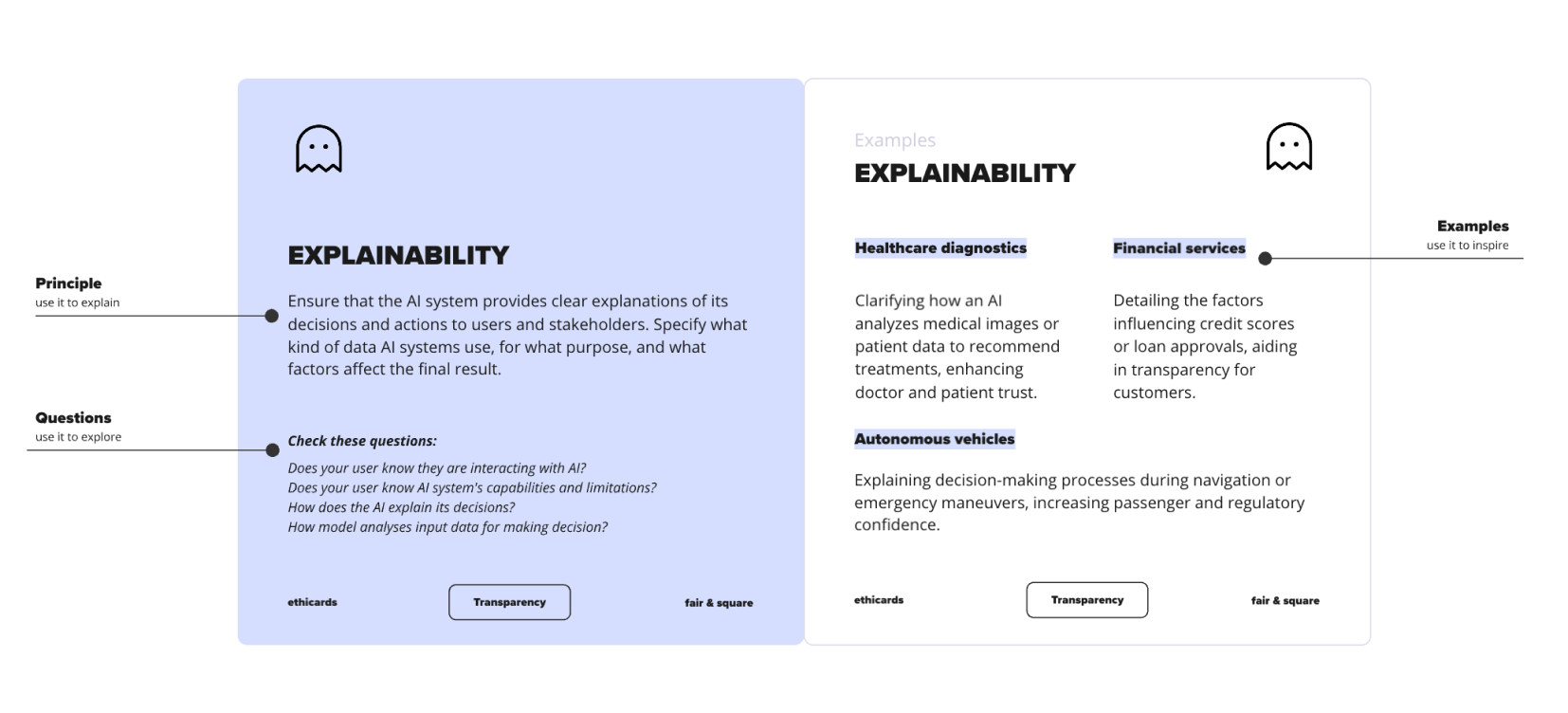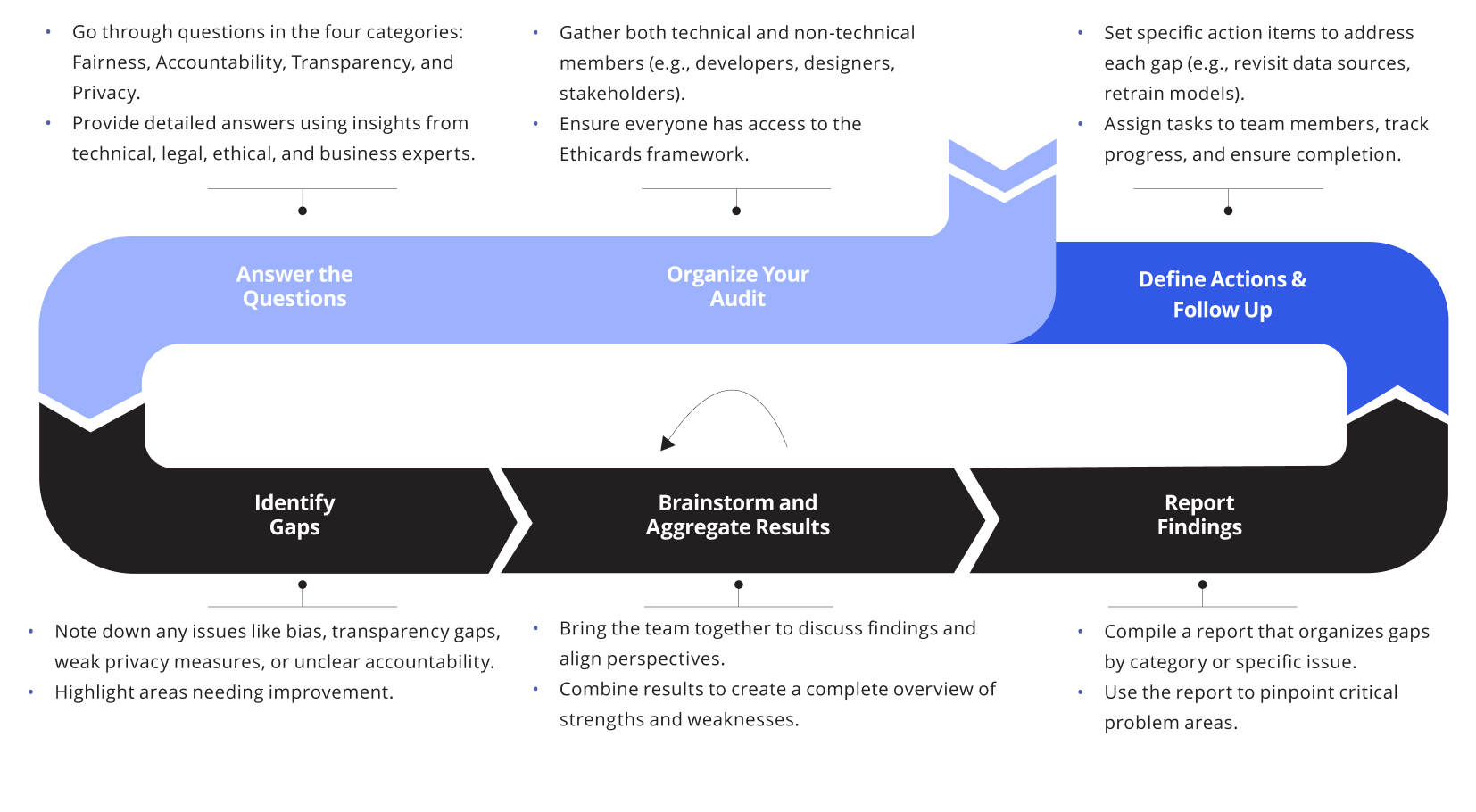Best Practices for Developing Fairness in AI Systems and System Audit – Ethicards
Introduction
Neglecting to establish a proactive risk management approach to AI can lead to costly compliance issues and reputational damage. As businesses increasingly adopt AI, ensuring fairness and ethics in these systems is more important than ever. In "Building Ethical and Safe AI: Your Business's Secret Weapon (Not a Scary Monster)," we introduced the main principles of responsible AI (RAI), which include fairness, accountability, transparency, and privacy. These principles are vital to building trust and ensuring AI systems operate equitably and competently.
This article looks at Ethicards, a valuable RAI tool developed by SoftServe. Ethicards function as a framework to be used in a variety of scenarios, from auditing AI systems to facilitating workshop activities with clients.
This framework is designed to apply to any AI solution, helping businesses ensure their AI is ethical and compliant with regulations, such as the EU AI Act. Using Ethicards, you can develop AI systems that meet legal standards and foster trust and reliability.
Business Value
As businesses expand Generative AI initiatives, they face complex legal and ethical challenges, making effective risk management essential. Ethicards provide a straightforward way for companies to address these concerns early, helping to avoid costly redevelopment.
For example, in a workshop led by SoftServe with a major European bank, Ethicards impressed the design team with its practical approach to RAI. The bank was able to streamline Gen AI design processes due to the collaborative approach and simplicity of Ethicards.
Similarly, for an insurance client needing to navigate ethical concerns and meet regulatory standards, SoftServe used Ethicards to create an RAI checklist that balanced ethics with compliance and efficiency. Ethicards accelerated the client’s auditing process and allowed for more accurate detection of ethical concerns and risk mitigation.

Key Advantages of Ethicards:
Proactive Risk Management: Addressing potential ethical concerns early in the process helps prevent costly redevelopment efforts.
Simplified Compliance and Risk Reduction: Streamlined validation processes aid in mitigating risks and ensuring adherence to ethical standards.
Improved Alignment: Foster better alignment among teams and stakeholders regarding key ethical priorities, ensuring everyone is on the same page.
Enhanced Reputation: Contribute to a positive brand image by developing socially responsible solutions aligned with ethical principles.
Ethical Culture Development: Encourage a culture of ethical awareness and education throughout the organization, reinforcing long-term values.
Challenges to Consider:
Regional Variability: Currently AI regulations are mandated only in the EU, with differing requirements across other regions. This may complicate global implementation.
Time Investment: Extra time is required for discussions and conducting workshops is required during the conceptual phase.
Industry-Specific Adaptations Needed: Tailored guidelines may be required to fully address all sector-specific ethical considerations.
Despite some challenges, Ethicards help address ethical concerns, promote social responsibility, and align AI initiatives with company values. They ensure that ethical considerations are a core part of the development process, leading to more robust and trustworthy outcomes.
Ethicards Explained: Structure and Idea
Ethicards were developed through extensive market research, analyzing how leading companies like Google, Microsoft, and IBM address ethical considerations in their AI solutions. This analysis highlighted various industry principles, which we distilled into a concise 4x4 framework: four pillars — transparency, privacy, accountability, and fairness — each containing four principles. Such a structured approach streamlines the process of confronting ethical questions and challenges, making it easier to ideate solutions for RAI.

Each Ethicard focuses on a specific principle, such as "Explainability" (see image above). On one side, it explains the principle and lists key questions to guide deeper understanding, such as, "How does the AI explain its decisions?" These questions serve as checkpoints throughout assessments, ideation, and development phases, ensuring proactive consideration of ethical aspects. On the other side, you’ll find practical examples of the principle's application, such as using AI for healthcare diagnostics, financial services, or autonomous vehicles, providing real-world context for each concept.
Auditing AI Systems With Ethicards: A Step-by-Step Guide
Auditing an AI system with Ethicards is a simple process that helps ensure your system aligns with RAI principles. Each pillar focuses on a specific aspect of AI ethics and includes questions that help you evaluate your system. Auditing step-by-step guide:

IMPORTANT: Regular audits are crucial for maintaining ethical standards. They allow you to monitor risks and address emerging issues over time.
Beyond Audits: Expanding the Use of Ethicards
Ethicards increase the effectiveness of workshops by helping teams identify potential ethical concerns early in the process. Integrating Ethicards into workshop activities provides a structured framework for embedding ethical considerations into decision-making. This proactive approach leads to more robust and socially responsible project outcomes.
Here's how Ethicards can be used in workshops:

Conclusions: Toward Ethical AI Systems for the Future

Ensuring fairness and ethics in AI systems is essential for building trust and maintaining compliance. Ethicards offer a practical framework to integrate ethical considerations at every stage of development, helping organizations proactively address potential issues and foster innovation.
SoftServe works with you to create ethical and responsible AI systems that align with your business goals.
Contact us today to develop responsible AI solutions and conduct a workshop.

